Fleurs du Mal Magazine


Or see the index
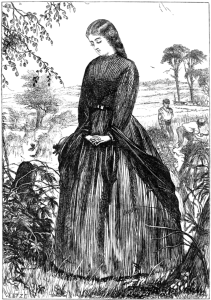
The Seasons
Spring—and her heart is singing
A song full of joyous cheer;
For each brightening day seems bringing
The hope of her life more near.
Summer—her heart is waiting;
Its dream is yet unfulfilled:
But her trust knows no abating,
Though the Spring’s glad song is stilled.
Autumn—her heart is burning
With the fever of restless fears;
And the darkened days returning
Bring her no relief save tears.
Winter—her heart is broken:
The struggles of Hope are o’er;
But the love that was here unspoken
Will be hers where hearts bleed no more.
Evelyn Forest
(Pen name of Anne Pares)
(? – ?)
The Seasons (1862-63)
Illustration: Frederick Eltze (1836–1870)
• fleursdumal.nl magazine
More in: # Classic Poetry Archive, Archive E-F, Archive E-F, Archive O-P, Archive O-P, Natural history

Song
What can it mean?—that glance so tender,
Out of the depths of two soft dark eyes;
Can it be earnest of heart-surrender,
Making me blest with a sweet surprise?
What can it mean?—white hands caressing
Between them a hand that is scarred and brown:
Is it a dream?—two soft lips pressing
That hard rough hand while the tears fall down.
What can it mean?—you kneel beside me,
Laying your dear head upon my breast,
Giving me all that you once denied me!
Is it, sweetheart, is it love confessed?
Evelyn Forest
(Pen name of Anne Pares)
( …-… unknown)
Song
Illustration: Frederick Eltze (1836–1870)
• fleursdumal.nl magazine
More in: # Classic Poetry Archive, Archive E-F, Archive E-F, Archive O-P, Archive O-P
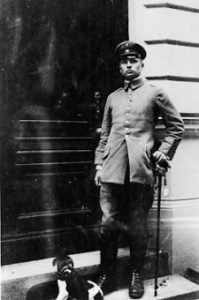
Schwermütig kam die Nacht …
Schwermütig kam die Nacht. Ich bin allein.
Rings wuchern Bücher, Möbel und Tapeten
Im gelben Licht der Lampe fremd und kalt.
Wie weh tun Sehnsucht, Nacht und Einsamsein!
Still möcht ich in dein junges Leben treten
Wie eine Wanderschaft durch einen grünen Wald.
Hans Ehrenbaum-Degele
(1889 – 1915)
Schwermütig kam die Nacht …
• fleursdumal.nl magazine
More in: #Experimental Poetry Archive, *War Poetry Archive, - Archive Tombeau de la jeunesse, Archive E-F, Archive E-F, Expressionism

Von des Daseins körperlicher Schwere …
Von des Daseins körperlicher Schwere
Überfallen, bedrückt und tief gehemmt,
Dürstet mein Gemüt nach einer Leere.
Draußen haben blasse Abendmeere
Straßen trüb und traurig überschwemmt.
Und die Stadt sinkt wie verwest und grau
In den Schoß der mütterlichen Nacht.
Tief in meiner Seele weint und wacht
Die Erinnerung an eine Frau,
An ein Lied, ein Buch, an Sonne, Blau,
An viel Not, an manche Lust und Pracht.
Schwach durchzittert vom Geläut der Qual
Treibt mein Tag in eine ernste Stille.
Dunklen Himmels glanzlose Pupille
Starrt durchs Fenster hoffnungsblind und fahl.
Hans Ehrenbaum-Degele
(1889 – 1915)
Von des Daseins körperlicher Schwere …
• fleursdumal.nl magazine
More in: #Experimental Poetry Archive, *War Poetry Archive, - Archive Tombeau de la jeunesse, Archive E-F, Archive E-F, Expressionism, Modernisme
Harvest Lingo is the fourteenth collection of poems by Lionel Fogarty, a Murri man with traditional connections to the Yugambeh people from south of Brisbane and the Kudjela people of north Queensland.
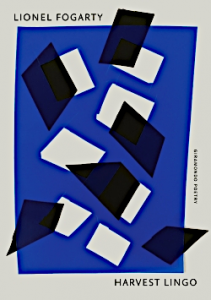 He is a leading Indigenous rights activist, and one of Australia’s foremost poets, and this collection displays all of the urgency, energy and linguistic audacity for which Fogarty is known.
He is a leading Indigenous rights activist, and one of Australia’s foremost poets, and this collection displays all of the urgency, energy and linguistic audacity for which Fogarty is known.
At the centre of the collection is a series of poems written in India. Deeply empathetic, these poems are remarkable for the connections they draw between the social problems the poet encounters in this country – poverty, class division, corruption – and those he sees in contemporary Australia, besetting his own people.
Other poems tell of encounters between people and between cultures, address historical and cultural issues and political events, and pay tribute to important Indigenous figures. There are intensely felt lyrics of personal experience, and poems which contemplate Fogarty’s own position as a poet and an activist, speaking with and for his community.
Fogarty’s poems are bold and fierce, at times challenging and confronting, moved by strong rhythms and a remarkable freedom with language. They are an expression of the ‘harvest lingo’ which gives the collection its title.
Lionel Fogarty was born on Wakka Wakka land, at Cherbourg Aboriginal Reserve in south-east Queensland in 1957. Throughout the 1970s he worked as an activist for Aboriginal Land Rights, and in the 1990s, after the death of his brother Daniel Yock, protesting against Aboriginal Deaths in Custody. His poetry collections date from the early 1980s; his most recent collections are Connection Requital; Mogwie-Idan: Stories of the Land; Eelahroo (Long Ago) Nyah (Looking) Mobo-Mobo (Future), all with Vagabond Press, and Lionel Fogarty: Selected Poems 1980-2017, published by re.press.
Harvest Lingo
by Lionel Fogarty
Poetry
Giramondo Publishing
112 pages
Paperback, 21 x 14.8 cm
Published June 2022
ISBN 9781925336177
$25,00
• fleursdumal.nl magazine
More in: #Editors Choice Archiv, - Book News, - Bookstores, Archive E-F, Archive E-F, Black Lives Matter, Racism
In her English-language debut, acclaimed French-language poet of the Palestinian diaspora Olivia Elias probes deeply into the upheavals of the twentieth and twenty-first centuries
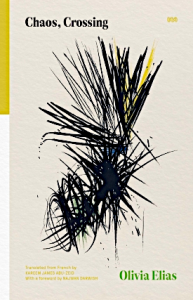 Poet of the Palestinian diaspora, born in Haifa in 1944, Olivia Elias writes in French. She lived until she was 16 years old in Lebanon where her family took refuge in 1948, then in Montréal-Canada, before moving to France.
Poet of the Palestinian diaspora, born in Haifa in 1944, Olivia Elias writes in French. She lived until she was 16 years old in Lebanon where her family took refuge in 1948, then in Montréal-Canada, before moving to France.
Her third and most recent collection, Chaos, Traversée, appeared in 2019. Characterized by terse, laconic language and strong rhythms, her poetry shows a deep sensitivity to the Palestinian cause, the plight of refugees and human suffering in general.
Her work, translated into English, Arabic, Spanish, Italian and Japanese, has been published in numerous journals and in anthologies.
Kareem James Abu-Zeid is a translator of writers from across the Arab world, including Najwan Darwish (Palestine), Adonis (Syria), Rabee Jaber (Lebanon), and Dunya Mikhail (Iraq). He has received an NEA translation grant, PEN Center USA’s Translation Award, a Fulbright Fellowship (Germany), and a CASA Fellowship (Egypt), among other honors. He is also the author of The Poetics of Adonis and Yves Bonnefoy: Poetry as Spiritual Practice.
Chaos, Crossing —translated by award-winning translator Kareem James Abu-Zeid—is a powerful chronicle of uprootedness, of times marked by inequality, injustice, and disconnection. These poems—presented here in a bilingual edition—seek the calm at the center of the storm, the still point amidst the chaos.
Chaos, Crossing
Olivia Elias (Author)
Kareem James Abu-Zeid (Translator)
Foreword by Najwan Darwish
Pub Date: 11/15/2022
Publisher: World Poetry Books
Product Number:9781954218079
ISBN978-1-954218-07-9
Binding: Paperback
Pages: 192
Price: $ 20.00
• fleursdumal.nl magazine
More in: #Editors Choice Archiv, - Book News, - Bookstores, Archive E-F, Archive E-F
En quelques pages, à la première personne, Annie Ernaux (1940) raconte une relation vécue avec un homme de trente ans de moins qu’elle.

Une expérience qui la fit redevenir, l’espace de plusieurs mois, la « fille scandaleuse » de sa jeunesse.
Un voyage dans le temps qui lui permit de franchir une étape décisive dans son écriture.
Ce texte est une clé pour lire l’œuvre d’Annie Ernaux — son rapport au temps et à l’écriture.
Annie Ernaux
Le jeune homme
Editions Gallimard
ISBN 9782072980090
Paru le 05 mai 2022
Collection Blanche, Gallimard
48 pages,
118 x 185 mm, sur Vélin pur fil
Genre : Romans et récits Époque : XXe-XXIe siècle
Prix : € 8,00
• fleursdumal.nl magazine
More in: - Book Lovers, - Book Stories, Annie Ernaux, Archive E-F, Archive E-F, Histoire de France
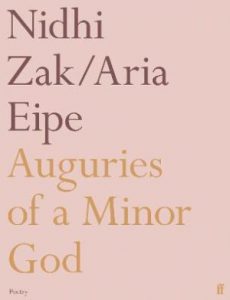 The debut collection of poetry from a virtuosic, compassionate new voice.
The debut collection of poetry from a virtuosic, compassionate new voice.
Nidhi Zak/Aria Eipe is a poet, pacifist and fabulist.
Born in India, she grew up across the Middle East, Europe and North America before calling Ireland home.
Founder of the Play It Forward Fellowships, she serves as poetry editor at Skein Press and Fallow Media, contributing editor for The Stinging Fly and an advisory board member of Ledbury Poetry Critics Ireland.
She is the recipient of a Next Generation Artist Award in Literature from the Arts Council of Ireland and the inaugural Ireland Chair of Poetry Student Award.
Nidhi Zak/Aria Eipe’s spellbinding debut poetry collection explores love and the wounds it makes. Its first half is composed of five sections, corresponding to the five arrows of Kama, the Hindu God of Love, Desire and Memory. Each arrow has its own effect on some body – a very real, contemporary body – and its particular journey of love.
The second is a long narrative poem, ‘A is for [Arabs]’, which follows a different kind of journey: a family of refugees who have fled to the West from conflict in an unspecified Middle Eastern country. With an extraordinary structure, yoking abecedarian and Fibonacci sequences, it is a skillful and intimate account of migration and exile, of home and belonging.
Auguries of a Minor God
by Nidhi Zak/Aria Eipe
Publisher: Faber & Faber
September 7, 2021
Language: English
Paperback: 120 pages
ISBN-10 : 0571365566
ISBN-13: 978-0571365562
£10.99
• fleursdumal.nl magazine
More in: #Modern Poetry Archive, - Book News, Archive E-F, Archive E-F, Archive Y-Z, Archive Y-Z
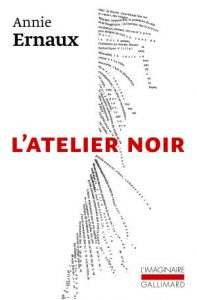 Tous les livres que j’ai écrits ont été précédés d’une phase, souvent très longue, de réflexions et d’interrogations, d’incertitudes et de directions abandonnées.
Tous les livres que j’ai écrits ont été précédés d’une phase, souvent très longue, de réflexions et d’interrogations, d’incertitudes et de directions abandonnées.
À partir de 1982, j’ai pris l’habitude de noter ce travail d’exploration sur des feuilles, avec des dates, et j’ai continué de le faire jusqu’à présent. C’est un journal de peine, de perpétuelle irrésolution entre des projets, entre des désirs. Une sorte d’atelier sans lumière et sans issue, dans lequel je tourne en rond à la recherche des outils, et des seuls, qui conviennent au livre que j’entrevois, au loin, dans la clarté.
A. E.
Parallèlement à ses romans, Annie Ernaux tient un journal d’avant-écriture ; une sorte de livre de fouilles, rédigé année après année, qui offre une incursion rare de « l’autre côté » de l’œuvre.
Plongé au cœur même de l’acte d’écrire, le lecteur devient témoin du long dialogue de l’autrice avec elle-même : la pensée taillée au couteau, des idées en vrac, des infinitifs en mouvement ; des associations de mots, de morceaux de temps, et de confidences.
Pour la réédition de L’atelier noir, Annie Ernaux a souhaité augmenter l’ouvrage de pages inédites de son journal de Mémoire de fille.
Annie Ernaux
L’atelier noir
Édition augmentée
Collection L’Imaginaire (n° 733), Gallimard
Parution: 10-02-2022 – Poche 10 €
180 pages, sous couverture illustrée, 125 x 190 mm
Achevé d’imprimer : 01-01-2022
Genre : Mémoires et autobiographies Catégorie – Littérature
Époque : XXe-XXIe siècle
ISBN : 9782072958441
• fleursdumal.nl magazine
More in: - Book News, - Book Stories, Archive E-F, Archive E-F
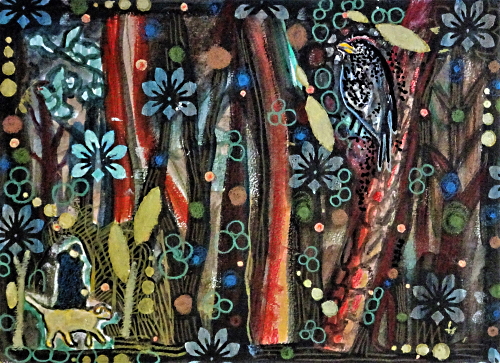
Anne Feddema
Kuierke – Skaad…Ljocht
Wandelingetje – Schaduw… Licht
(Particuliere collectie NL)
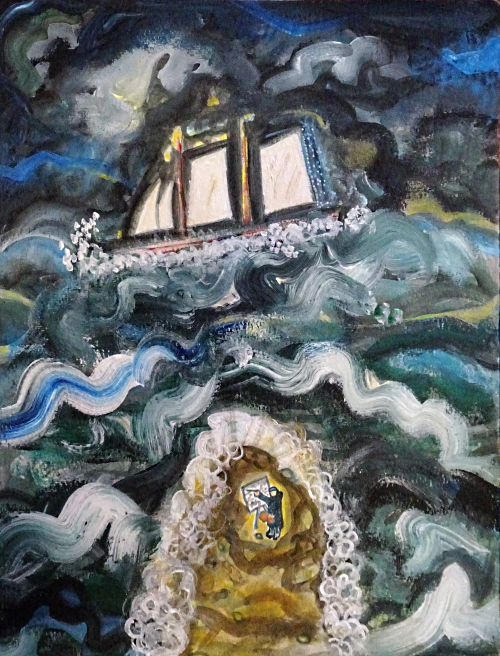
Anne Feddema
Min Waarskilder – Skip
Slecht Weerschilder – Schip
(Particuliere collectie NL)
Anne Feddema (Leeuwarden, 1961) is schrijver, dichter en beeldend kunstenaar. Hij volgde een beeldende opleiding aan het gerenommeerde Ateliers ’63. In 2007 ontving hij voor zijn schilderkunst de Margaretha de Heerprijs en in 2009 de Gysbert Japicxprijs voor Friese literatuur. Zijn beeldend werk is getoond in musea zoals het Groninger Museum, het Fries Museum en Museum Belvédère. Feddema schrijft zowel in het Fries als in het Nederlands. Daarnaast vertaalt hij werk van andere dichters in het Fries. Verder trad Anne Feddema regelmatig op met zijn gedichten, o.a. tijdens het Poetry International-festival in Rotterdam.
©Anne Feddema
• fleursdumal.nl magazine
More in: Anne Feddema, Archive E-F, Archive E-F, Feddema, Anne
In about: blank, Tracy Fuad builds a poetics of contemporary dissociation.
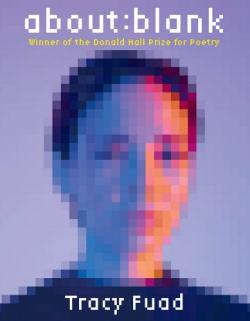 Funny, plaintive, and cutting, this formally inventive debut probes alienation in place and in language through the author’s consideration of her own relationship to Iraqi Kurdistan. about: blank–the title of which is the universal URL for a blank web page–complicates questions of longing and belonging. Interrogating the language of internet chatrooms, Yelp reviews, and the Kurdish dictionary, the poems here leap surprisingly between subjects to find new meaning.
Funny, plaintive, and cutting, this formally inventive debut probes alienation in place and in language through the author’s consideration of her own relationship to Iraqi Kurdistan. about: blank–the title of which is the universal URL for a blank web page–complicates questions of longing and belonging. Interrogating the language of internet chatrooms, Yelp reviews, and the Kurdish dictionary, the poems here leap surprisingly between subjects to find new meaning.
Written before and during the years the author spent living in Iraqi Kurdistan, the collection documents the alienation of being inside, outside, and between language(s) and the always-already terror of grammar. At once haunted and humorous, about: blank inhabits and exhibits the disorientation and fragmentation that is endemic to the internet era, and mourns the loss of a more embodied existence.
Tracy Fuad is the author of PITH, winner of the Gloria Anzaldúa Prize, and DAD DAD DAD DAD DAD DAD DAD. Her work has appeared in Poetry, the Best New Poets Anthology, the New Republic, and elsewhere. She is a graduate of the Rutgers-Newark MFA program and a 2021-2022 Writing Fellow at the Providence Fine Arts Work Center.
Title: about: blank
by Tracy Fuad
Language: English
Publish Date: October 19, 2021
Publisher: University of Pittsburgh Press
Pages 96
Type: Paperback
EAN/UPC 9780822966685
Price $18.00
• fleursdumal.nl magazine
More in: #Editors Choice Archiv, - Book News, Archive E-F, Archive E-F, LITERARY MAGAZINES
Naoko Fujimoto translates her poems (that are written in English on flat paper) into words and images to create a contemporary picture scroll.
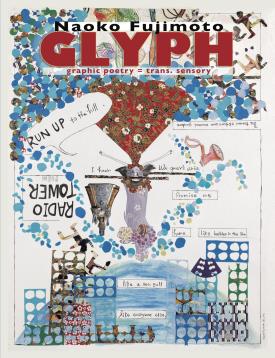 The picture scroll in Japanese is Emaki (eh-MA-kee) and the style has been popular since the 7-16th centuries in Japan. It is still a widely recognized art style in Japan and the rest of the world. Emaki is akin to a current graphic novel / poetry / comic. One of the most famous Emaki is the Tale of Genji, which is a fictional (perhaps gossip) story about a handsome son of the emperor.
The picture scroll in Japanese is Emaki (eh-MA-kee) and the style has been popular since the 7-16th centuries in Japan. It is still a widely recognized art style in Japan and the rest of the world. Emaki is akin to a current graphic novel / poetry / comic. One of the most famous Emaki is the Tale of Genji, which is a fictional (perhaps gossip) story about a handsome son of the emperor.
The graphic poetry project is also meant for the viewer to transport their senses from the flat paper and bridge the gap between words and images that will connect with their physical counterparts. Like a historical Emaki, there are side stories hidden behind some of the main graphic narratives— be they comedic or serious— for audiences to interpret. All of the details (choice of words, origami paper, or styles) have a specific meaning to contribute to the whole.
In June, 2016, Naoko Fujimoto decided to take a year off to be a full-time poet and artist. People around her asked why she was leaving a stable job, and if she was going to be a starving artist. She wanted to find out how far she can succeed as a poet and artist. After all, if she gets lost, she can just come back to what worked before.
During the year, she had opportunities to not only read books, but also explore and live with classic and contemporary works, such as the Massachusetts Museum of Contemporary Art, Metropolitan Museum of Art, San Francisco Museum of Modern Art, Art Institute of Chicago, Tokugawa Museum, and Museum of Contemporary Art Tokyo. There, she revisited her idea of how she could create an effective melding of poetry and art; perhaps, words and images.
The following, entitled “The Duck’s Smile”, was her first attempt. She wrote an original poem for a project named, “Killing Sally McHill”, which was a protest against common violence hidden around the house, school, office, and society. “The Duck’s Smile” was specifically written about a hierarchy in a small community between the narrator and Sally. Her first graphic poem adapted a written poem into a graphic narrative. The poem started from the top left corner and progressed to the bottom right. It took a simple black and white art approach, but did not quite embody how she wanted it to be represented.
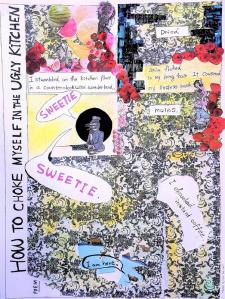 Naoko Fujimoto researched art works of inclusions of “word” and “image” such as László Moholy-Nagy, Hiroshige Utagawa, William Blake, Francisco Goya, and many other writers and artists. Then when she observed works by a German painter and sculptor, Anselm Kiefer, she understood that poetry must have explosions of creativity. Coincidentally, she had the chance to attend a workshop with Robin Coste Lewis, who critiqued the poems to be tight in structure, but reminded to forget about grammar and rules from time to time to experiment freely.
Naoko Fujimoto researched art works of inclusions of “word” and “image” such as László Moholy-Nagy, Hiroshige Utagawa, William Blake, Francisco Goya, and many other writers and artists. Then when she observed works by a German painter and sculptor, Anselm Kiefer, she understood that poetry must have explosions of creativity. Coincidentally, she had the chance to attend a workshop with Robin Coste Lewis, who critiqued the poems to be tight in structure, but reminded to forget about grammar and rules from time to time to experiment freely.
So she chose to adapt a traditional Japanese Emaki style (an illustrated narrative art). The original poem was carefully scattered specific phrases or implied images were selected, with the rest being ignored (like the poetry erasure technique). She traveled to find paper and objects, such as supermarket advertisements, birthday gift wrapping, postcards, origami, magazines, and other materials rich in color and texture. She wrote about relatable life conflicts, so using common objects in turn grounded her graphic poetry.
Naoko Fujimoto was born and raised in Nagoya, Japan. She studied at Nanzan Junior College and received BA and Master’s degrees from Indiana University. Recent work appears or is forthcoming in POETRY, Kenyon Review, Seattle Review, Quarterly West, North American Review, Hayden’s Ferry Review, Prairie Schooner, Crazyhorse, and The Arkansas International. She is the author of Glyph:Graphic Poetry=Trans. Sensory (Tupelo Press, 2021), Where I Was Born (Willow Publishing, 2019), and three chapbooks. She is an associate & outreach translation editor at RHINO Poetry. (naokofujimoto.com)
Glyph: Graphic Poetry=Trans. Sensory
by Naoko Fujimoto
Published: June 2021
ISBN: 978-1-946482-52-5
Publisher: Tupelo Pess
1st edition (June 1, 2021)
Language : English
Paperback
64 pages
ISBN-10 : 1946482528
ISBN-13 : 978-1946482525
$21.95
# new poetry
Naoko Fujimoto
Glyph: Graphic Poetry=Trans. Sensory
• fleursdumal.nl magazine
More in: #Archive Concrete & Visual Poetry, *Concrete + Visual Poetry K-O, - Book News, Archive E-F, Archive E-F, Art & Literature News, AUDIO, CINEMA, RADIO & TV, MUSEUM OF LOST CONCEPTS - invisible poetry, conceptual writing, spurensicherung, Visual & Concrete Poetry
Thank you for reading Fleurs du Mal - magazine for art & literature